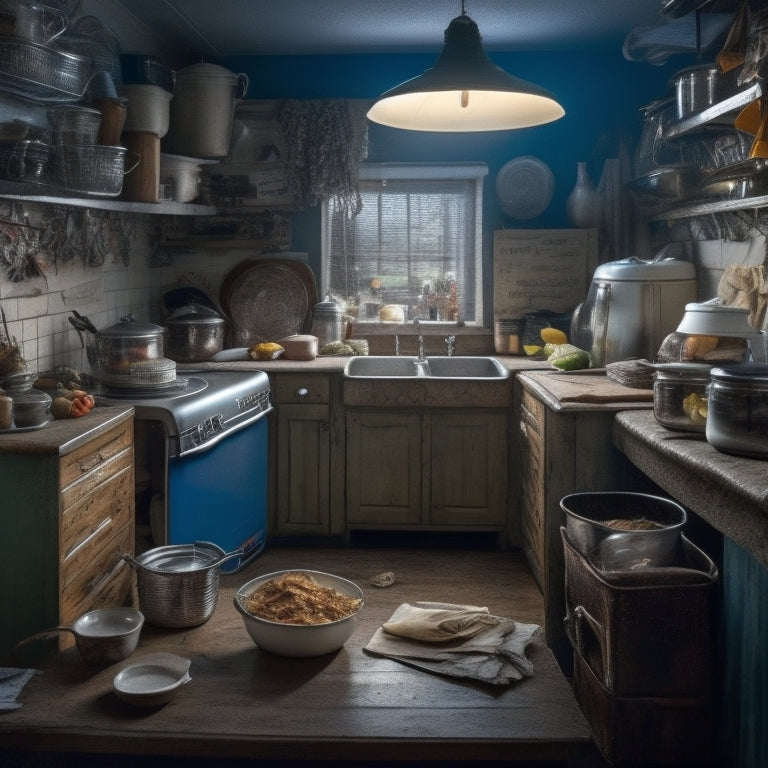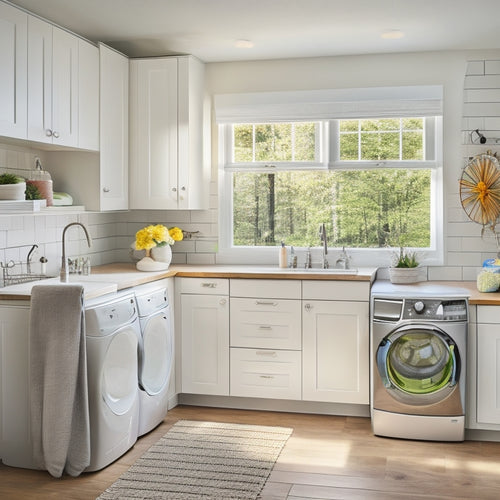
Why Cluttered Kitchen Cabinets Are Holding You Back
Share
You're likely unaware of how cluttered kitchen cabinets are silently sabotaging your daily routine. They're stealing precious time, draining your mental and physical energy, and hiding in plain sight. Cluttered cabinets lead to feelings of anxiety, stress, and overwhelm, while also posing health hazards like pest infestations and hidden fire hazards. You're wasting up to an hour a day in lost productivity, and your kitchen's functionality is severely impacted. By addressing these issues, you can regain control and start your day on a peaceful note. Discover the simple steps to break free from the chaos and transform your kitchen into a haven of organization and efficiency.
Key Takeaways
• Cluttered kitchen cabinets lead to feelings of anxiety, stress, and overwhelm, hindering mental clarity and focus.
• Hidden dangers like pest infestations, fire hazards, and toxic substances in cluttered cabinets pose health risks and compromise well-being.
• Disorganization in kitchen cabinets costs up to an hour a day in lost productivity, leading to morning rush and demotivation.
• Cluttered cabinets slow down meal prep, disrupt kitchen workflow, and encourage bad habits, impacting kitchen function and overall efficiency.
• Disorganization in kitchen cabinets leads to unnecessary purchases, wasted income, and financial burden, draining productivity and resources.
The Chaos of Cluttered Cabinets
Every day, you likely waste precious time digging through your kitchen cabinets, only to find yourself buried under a mountain of mismatched containers, expired food, and forgotten kitchen gadgets. This daily struggle isn't just frustrating, but it's also a reflection of your Cabinet Psychology - the emotional connection you have with your kitchen space.
When your cabinets are cluttered, you feel anxious, overwhelmed, and stressed. This sensation is often referred to as Kitchen Anxiety.
As you stand in front of your cabinets, feeling defeated, you can't help but wonder why you can't seem to get your kitchen organized. The truth is, cluttered cabinets aren't just a result of poor organization, but also a symptom of deeper issues.
Perhaps you're holding onto items from the past, or you're afraid to let go of things that no longer serve you. Whatever the reason, it's time to take control of your kitchen and your Cabinet Psychology.
Impact on Mental and Physical Health
One in five people experience increased stress levels due to cluttered kitchen cabinets, which can have a profound impact on both your mental and physical well-being. You're not alone if you feel overwhelmed every time you open your cabinet doors. Cluttered kitchen cabinets can be anxiety triggers, making it difficult for you to relax and focus. The constant visual reminders of disorganization can weigh heavily on your mind, affecting your mood and overall sense of calm.
Imagine walking into a serene kitchen, where everything has its place, and you can breathe a sigh of relief. That's what a decluttered kitchen cabinet can offer – a calming environment that sets the tone for a peaceful day. By tidying up your kitchen cabinets, you're not only reducing stress but also creating a space that promotes mental clarity and focus. You'll feel more in control, more confident, and more at ease in your own kitchen.
It's time to take back control of your kitchen and your well-being. Start decluttering today, and discover the positive impact it can have on your mental and physical health.
Hidden Dangers in Kitchen Cabinets
Beyond the stress and anxiety cluttered kitchen cabinets can cause, you may be unaware of the hidden dangers lurking within, putting your health and safety at risk.
As you rummage through your cabinets, you may unintentionally disturb pests that have made themselves at home, spreading diseases and contaminating your food.
Additionally, cluttered cabinets can also harbor fire hazards, such as faulty wiring or flammable materials, which can lead to devastating consequences.
Here are three hidden dangers to look out for in your kitchen cabinets:
-
Pest infestations: Rodents, cockroaches, and other pests can thrive in cluttered cabinets, spreading diseases and contaminating your food.
-
Fire hazards: Faulty wiring, flammable materials, and appliances can spark fires, putting your home and loved ones at risk.
-
Toxic substances: Expired or contaminated food, cleaning supplies, and other chemicals can pose serious health risks if not stored properly.
It's essential to take control of your kitchen cabinets and eliminate these hidden dangers. By doing so, you'll not only create a safer and healthier environment but also reduce your stress levels and improve your overall well-being.
Lost Time and Frustration
Cluttered kitchen cabinets can cost you up to an hour a day in lost productivity, as you struggle to find what you need amidst the chaos. This daily rush of searching for utensils, ingredients, or cookware can be overwhelming, especially during morning madness when you're trying to get breakfast on the table.
You're not alone; many people waste valuable time digging through cluttered cabinets, only to find what they need hidden in the back or, worse, realize they forgot to buy it. The frustration that comes with cluttered kitchen cabinets can be demotivating. You start your day feeling stressed and anxious, which can set the tone for the rest of your morning.
Imagine having a peaceful morning routine, where you can effortlessly find what you need and enjoy a calm, organized kitchen. By decluttering your kitchen cabinets, you can regain that lost hour and start your day feeling more in control. It's time to take back your morning and start fresh.
Clutter's Effect on Kitchen Function
As you navigate your kitchen, you're likely aware that cluttered cabinets hinder your ability to cook efficiently, causing meal prep to take longer and making it more challenging to maintain a clean kitchen. This clutter not only affects your kitchen workflow but also your overall well-being.
A disorganized kitchen can lead to increased stress levels, making mealtime a challenging task.
Here are three ways cluttered cabinets impact your kitchen function:
-
Slows down meal prep: Cluttered cabinets make it difficult to find the ingredients and cooking tools you need, prolonging meal prep time and making it more frustrating.
-
Disrupts kitchen workflow: Cluttered cabinets create a chaotic kitchen environment, making it challenging to move around and work efficiently.
-
Encourages bad habits: Cluttered cabinets can lead to poor kitchen habits, such as leaving dirty dishes or utensils out, which can attract pests and create an unhealthy kitchen environment.
The Cost of Disorganization
Disorganization takes a significant toll on your wallet, with the average American household wasting around 10% to 15% of their income on unnecessary purchases and replacements due to cluttered kitchen cabinets.
This financial burden adds up quickly, and it's not just about the money. When you can't find what you need, you waste valuable time searching for it, leading to a significant productivity drain.
You're not alone in this struggle; many people find themselves buying duplicates of items they already own simply because they can't locate them in the clutter.
Simple Steps to Decluttering Success
As you tackle your cluttered kitchen cabinets, you're ready to take control and create a more functional space.
To get started, you'll need to clear out the clutter and organize what's left in a way that makes sense for your lifestyle.
Clear the Clutter
You're ready to tackle the chaos and clear the clutter from your kitchen cabinets, so let's get started with a simple, step-by-step approach that yields lasting results.
Clearing the clutter is about more than just tidying up - it's about creating a space that sparks joy and gives you a sense of personal freedom.
To get started, follow these three essential steps:
-
Purge the unnecessary: Be ruthless - if you haven't used it in the past year, it's probably safe to get rid of it. This will help you focus on what's truly important and streamline your kitchen workflow.
-
Categorize and group: Once you've purged your unwanted items, group similar items together (e.g., all baking supplies in one area). This will help you see what you have and where it should go.
-
Design with intention: Think about your design aesthetics and how you want your kitchen to look and feel. Consider the flow of your workspace and how you can create a harmonious, clutter-free environment that inspires creativity and efficiency.
Organize Your Space
With your kitchen cabinets purged and categorized, it's time to create a functional layout that maximizes storage and efficiency. You're now ready to organize your space, giving you the freedom to express your personal style.
Start by designating zones for specific items, such as a baking station or coffee bar. This will help you maintain order and make the most of your cabinet space.
Next, consider the items you use most frequently and place them in easy-to-reach locations. This will save you time and energy in the long run. You can also use dividers, baskets, or bins to keep similar items together and prevent clutter from building up again.
By creating a thoughtful layout, you'll gain creative freedom to focus on what matters most – cooking and sharing meals with loved ones. Your organized kitchen cabinets will become a reflection of your personal expression, showcasing your unique style and flair.
With a functional and efficient space, you'll feel a sense of belonging and pride in your kitchen.
Maximizing Small Kitchen Spaces
Optimizing your kitchen's layout is crucial when dealing with limited square footage, and cleverly arranging your cabinets is essential to maximizing small kitchen spaces. You need to make the most of every inch to create a functional and comfortable cooking environment.
To achieve this, focus on incorporating space savers into your design.
Here are three ways to do so:
-
Corner Optimization: Install corner cabinets or carousels that can rotate to bring items to the front, making the most of the often-wasted space in corners.
-
Vertical Storage: Use wall-mounted shelves, hooks, or pot racks to keep items off the countertops and floor, freeing up space for food preparation and cooking.
-
Narrow Cabinets: Choose slim cabinets or drawers that fit snugly between appliances or in tight spaces, providing additional storage without taking up too much floor space.
Maintaining Your Newfound Order
How will you guarantee that your newly organized kitchen cabinets remain clutter-free and functional over time? The key to maintaining your newfound order lies in establishing daily habits that promote organization and ongoing reflection.
Start by setting aside a few minutes each day to tidy up your kitchen, putting away items that are out of place and wiping down surfaces. This daily routine will help prevent clutter from building up again.
Next, schedule regular reflection sessions to assess your kitchen's organization. Ask yourself: Are there any areas that are still causing frustration? Are there any items that are no longer serving a purpose? Be honest with yourself, and make adjustments as needed.
This ongoing reflection will help you stay on top of your kitchen's organization and make sure it continues to meet your needs.
Frequently Asked Questions
Can a Cluttered Kitchen Cabinet Affect My Cooking Skills and Confidence?
You're right to wonder: a cluttered kitchen cabinet can stifle your cooking skills and confidence, obstructing Mental Clarity and Culinary Freedom. When your space is organized, you'll feel more focused and empowered to experiment and create with ease.
How Do I Declutter Kitchen Cabinets With Limited Storage Space?
To declutter kitchen cabinets with limited storage space, you're going to maximize shelves by using stackable containers and baskets, and utilize corners with carousels or Lazy Susans to make sure every inch is optimized for efficient storage.
Are There Any Eco-Friendly Ways to Organize My Kitchen Cabinets?
"Like a master chef whipping up a storm, you're seeking eco-friendly solutions to tame the cabinet chaos. Opt for sustainable storage options made from eco-friendly materials like bamboo, recycled wood, or repurposed containers to create a harmonious kitchen haven."
Can I Repurpose Old Kitchen Cabinets to Save Money?
You can breathe new life into old kitchen cabinets, embracing Upcycled Chic while being Budget Friendly. Refurbish or repurpose them to save money, and give your kitchen a fresh, eco-conscious look that's uniquely yours.
How Often Should I Clean and Organize My Kitchen Cabinets?
You should clean and organize your kitchen cabinets every 3-6 months, implementing a seasonal purge to remove expired items and maintain cabinet maintenance, ensuring a clutter-free space that sparks joy and belonging.
Related Posts
-

Revamp Your Laundry Room With Smart Space-Saving
You're tired of feeling cramped and disorganized in your laundry room, and it's time to revamp the space to make the ...
-

Community Engagement: Learning Through Professions
Community engagement is a powerful tool for fostering a deeper understanding of various professions among children. B...

